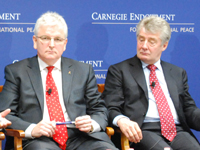Registration
You will receive an email confirming your registration.
The recent release of the United Kingdom's goals for the 2010 NPT Review Conference and the ongoing Trident debate illustrate the shifts occurring in nuclear weapons policy in both the UK and U.S. To discuss those changes, Carnegie and the British American Security Information Council hosted a discussion among current and former high-level British officials. The discussion touched on the need for American leadership in pursuit of global nuclear disarmament, the importance of developments in Iran for British security, and the challenges of engaging public opinion across Europe on issues of nonproliferation and disarmament.
Participants included former UK Defense Secretary Des Browne, former British Ambassador to the UN Lord Hannay of Chiswick, Shadow Minister for Foreign Affairs Dr. David Lidington MP, and former Foreign Office Minister Tony Lloyd MP. Carnegie’s Deepti Choubey moderated.
Building Connections and Engaging Public Opinion
- Lloyd stressed that now is an opportune time for the UK to share its experience of reducing the size of its nuclear arsenal with American policy makers.
- Browne announced the creation of a Top Level Group of former British officials and generals to educate key decision makers in Washington on the intricacies of nuclear disarmament and nonproliferation.
The Importance of U.S. Leadership
- There is a "need," Lloyd said, "for American leadership, but one that listens to its friends, allies, and the world."
- Hannay warned that if President Obama fails to win domestic support for this agenda, particularly for crucial initiatives such as the Comprehensive Test Ban (CTBT), the United States could face adverse consequences for its international image and reputation.
The Role of International Organizations
- Hannay added that the long-term health of the disarmament agenda depends on translating political enthusiasm into "rules-based arrangements." The UN is important, he said, for "mobilizing a wide range of countries," but its role shouldn’t be overstated.
- Lloyd and Lidington called for raising the costs of developing a rapid or "breakout" nuclear weapons capability. Lloyd described the "ideal situation, which is where some parts of the fuel cycle" are placed under international control.
Support for Disarmament in the U.K.
- Lloyd noted that public opinion on disarmament may move from disinterested to skeptical should Iran develop a nuclear weapon.
- Prompted by reports that the Conservative party will win a majority in the next general election, Lidington said that there was a "fair degree of bipartisanship" on the issue of nonproliferation, although Conservatives were not optimistic about achieving disarmament in the near future. Nevertheless, he said a disarmament agenda provides a "framework and a destination," and added that with the exception of a few "tweaks," British positions at the 2010 NPT Review Conference would probably change little in the event of a Conservative victory.
- Hannay noted that the issue of a nuclear deterrent enjoyed support among Britain's three top political parties but that there was a concern that a disarmament announcement by Britain would have little to no effect on the calculations of other nuclear-armed states or Iran.
- Browne added that Britain is reluctant to place itself in a position where a potential foe would test its allies’ resolve and commitment to British security
- Browne explained the lack of a consensus in the UK on the issue and a virtually non-existent public debate created added challenges. "Europe…disturb[s] the issue at their own peril, because it will create a debate…that many politicians would be uncomfortable with."
